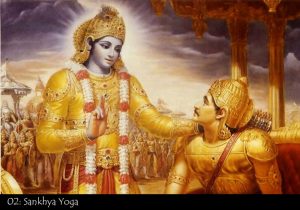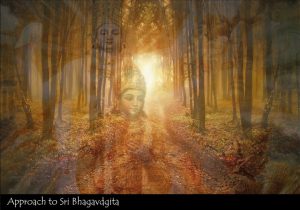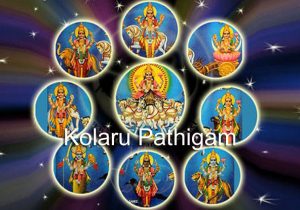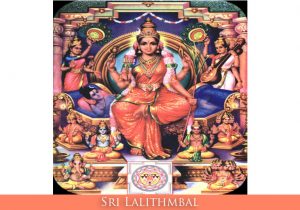Sri Sītayanam
Conversation with Mother Sita
அன்னை சீதம்மாவுடன் உரையாடல்
With some anxiety I looked into the garden. In the darkness, near the Tulsi plant I could see as if someone was sitting and singing with the head gently nodding. Perhaps, it was the breeze, I thought, shaking the plants and drawing some imaginary imagery in my mind. Intrigued, I went to the garden, with a candle light in my hand.
Near the Tulsi plant, I can see someone sitting and singing.
Ātma Rāma Rām, Paramātma Rāma Rām
Frozen with anxiety, and at the same time filled with immense joy, I was thrilled at what I saw. With ravishing beauty and regal grace, there was a maiden, seated with dews of tear waiting to drop at the edge of her long flowery eyes that were half closed. Her face was brimming with joy and as all-bestowing-mother, she was sitting in absolute bliss. Tongue-tied, I stood there simply listening to her singing. The verse and its deep import, wrapped in her melodious and enchanting voice, gently pierced into my heart for good.Ātma Rāma Rām, Paramātma Rāma Rām
(Ātma Rāma)
aham patārtta – svayam prahāsa
aprameya Rām – (Ātma Rāma)
dhInabhantu Rām – trivarkatAya Rām
divyanāma pUjyāya –
dhivākarāya Rām – (Ātma Rāma)
chitābāsha bhramā nāsha
chit-sukhāti Rām –
stitaprahāsa Rām – (Ātma Rāma)
Without any intent to interrupt that ecstasy, I called her.
“Ammā”.
She opened the petal of her flowery eyes, the radiance of which soaked me in an inexplicable delight. I thought to myself: ‘Oh I know this divine face and I have seen it before’. My heart was pumping, and in a flash, I realized: She must be Sitāmmā. I have the same face in the picture inside my house, standing gracefully next to Lord Sri Rām. I have been looking for a while to get an idol of Sitāmmā to keep next to ‘Sri Kotanda Rāmar’ in our prayer room for many years. Seeing Sitāmmā was like the heavens at the door steps.
I asked with a trembling voice.
“Ammā, am I seeing Sri Sitā Pirātiyar, the divine escort of Sri Rām?”
Saying thus I prostrated on the floor and barely lifting my head asked, “O Mother, Are you Sitāmmā? Am I dreaming this, Ammā, please tell me?”
She stopped her singing and said.
“Yes, I am! In the breeze of dawn, I sing the glory of my Lord and then in the day, dusk, night thus forever! Those who truly seek the grace of Sri Rām shall see how the rhythm of nature too forever sings the hymn of Rām.”
“Ammā, I see a tinge of tears in your all bestowing eyes and in your beautiful song, a touch of yearning? Are you missing the Lord Ammā?”
“O Fool! How can I ever be away from my Lord! How can the Lord be away from all! I am not seeking as I always see and He is the ‘seer’ in me! I sing in happiness and rejoice as I know who I am.”
“Please grant me the wisdom to know you Ammā! Grant me the wisdom to know Lord Sri Rām”. I pleaded, knowing it as the once in life opportunity, to have it now or never!
Sitāmmā laughed.
“Know yourself! In knowing the truth nature of your Self, you shall know me and you shall know the Lord. The descent of Lord on earth and the embodied life of Sri Rām was only to impart this truth. His life will remain forever as the testimony of glory and the beacon of light to humanity.”
“Yes Ammā. We all revere the magnum opus ‘Rāmāyanam’, the ‘Life of Lord Rām’. We always try to learn from it to refine our conduct in this world.”
“The word ‘ayanam’ means ‘path’. The epic ‘Rāmāyanam’ is all about the ‘path-of-Rām’. Humanity should follow the path that Lord Rām unfailingly followed and stood for. It is the path of ‘Dharma’, the ‘path of righteousness. The seekers of truth and salvation will take
‘Rāmāyanam’ to give the ‘path-to-Rām’.”
“Ammā, Be merciful and teach this child the truth.”
“Rām is ‘Brahmam’, the eternal blissful existence, that pervades all as ‘Paramātma’ and also indwells in every being as the ‘Ātma’. It is said, ‘sarve ramanti yasmin iti rama:’. Know that the unattached awareness in every being is ‘Rāma’ – the ‘Ātmarāma’. In all embodiments, when the senses, the ten subtle organs of perceptions and actions – ‘indriyā’ – are in control and the mind is full of ‘satva-guna’ or purity, the effulgence of Ātmarāma shines through! ‘Dasaratha’ symbolizes such control over the sensory impulses and ‘Kausalya’, the pure mind. In their union of such control and clarity is Lord Rām. In His presence, there is only peace no war. That is why Ram’s birth place, the ‘Ramjanma-bhumi’ is known as ‘Ayodhya’, a place without wars.”
“Ammā, may I ask about your divine nature? In the epic, you came from the earth, merged into the fire and now you appear in the breeze. Please enlighten me mother”, I pleaded.
“I am all that you see. I am the cause of all that is in the Nature. The primordial elements of Nature come out of my womb. I am the ‘Mula-prakriti’, the fundamental cause of all diversity. Devotees call me ‘Ādi-Nārāyani’ and ‘Sri Lakshmi’ etc. Those who know the truth of Veda call me as ‘Parāshakti’ and ‘Māha-Māya’. Simply take this: I am the power of the Lord and therefore I exist in the Lord. I abide forever in the ever witnessing existence of bliss – Lord Rām.”
“Ammā, You are the cause of all, You are the mother of all. Yet, why did you undergo such immense pain in your embodiment as Sitāmmā.”
“I am the cause of all and therefore the reason for all diversity. Embodiments and the diversity are only created for the enjoyment. But lo, how such a pious motive is turned into grief and despair in human-life! The very nature of existence in embodied form is to enjoy the diversity and therefore the welcoming experiences of the opposites – the good and bad – as one and the same. When this is not understood, humans create the endless cycle of grief, Samsārā. So the troubles are not in the manifested diversity but the way in which you handle it. Therefore, see the ‘Path-of-Rām’ also showing the ‘Path-to-Rām’”.
“Ammā, You have to teach the way forward.”
“That is why the Seers call me ‘Mula-vidya’, the fundamental knowledge to truth. But when mesmerized in the duality of things, you all are engrossed in the ‘mula-avidya’, the fundamental ignorance as your inherent nature.”
I sat under the feet of Sitāmmā.
“The ‘bow-of-Sitā’ represents ‘the will of Sita’, the ‘icchā-shakti’. It is the power of desire that dominates the mind. When desires are uncontrolled, one loses one’s orientation towards the truth. Control of desires is never easy for the uninitiated. That is why none could break the ‘will of Sita’ except Lord Rām, Who is free from all attachments. The divine marriage of Sita to Sri Rām is the abiding of the mind in the Ātma, to remain forever in bliss.”
“Ammā, why then were so many troubles that You and the Lord had to go through!”
“Only when the mind turns away from Ātma, mainly because of its ‘ego’ and as a consequence hold a false identify as ‘Jivā’, then the trouble starts. With ego and ownership, Jivā goes after desires; that is when the blissful existence is replaced by grief and delusion. The underlying cause for such dispersion from the focus on Ātma is the loss of sense control. ‘Dasarath’ yielding to the desires of ‘Kaikeyi’ marks the lose of sense-control and emotional-freedom to passion. When that happens, the Jivā faces conflict. That is why the departure from Ayodhya happened to wander into woods. Even in such hardships, as long as the mind is focused on Ātma, there is nothing to worry. Such was the joyful life of renunciation for us in the forest. But when the Jivā falls prey to desires, grief is certain. Desires on external pleasures that came in the form of ‘golden deer’ impacted the sense of balance and the Jivā loses its focus on, and proximity to, the glorious power and purity of the Ātma. That is why Rāma went away; the intensity of desire also drove away the dispassion, or ‘vairāgya’ that was guarding in the form ‘Lakshmana’! What more to say about the adverse and immense power of desires! This is what I have shown. The elusive ‘golden deer’ represents the sensual pleasures of temporal nature that steal our focus and drag our minds. You should know what happened then, right?”
“Yes Ammā, the evil Rāvana kidnapped you and imprisoned in severe conditions. ”, I said with some fear.
“That shows, when the mind turns away from the Ātma, and the virtuous ‘vairāgya’ is lost, then the ten indriyā or the sensory powers take control of the mind. The ten-headed Rāvana was none other than entrapping sensual desires. Those dip you deep in the perpetual entrapment of Samsārā.”
“Ammā, did you suffer from the hardship at the hands of Rāvana?”
Laughingly Ammā said, “How can anyone, whose focus is always on the Lord, be ever unhappy! Untouched by the strength of the ten-headed Rāvana, the weakening senses, I, the pure mind, remained grief-free under the tree aptly named as ‘Ashoka’, meaning ‘one without sorrow’. My tears and anxiety were only to enact the power of penance to reconnect with ones’ true self, and as a lesson to the humanity. So deem that my stay under the Ashoka tree was the penance, similar to what I am doing near this holy Tulsi Plant. Penance should be the way of life; it is the perpetual process of reinforcing one’s unfailing union with the Lord. When there is penance, the Rāvanas are just silly impulses and the crankiness of the deluded mind. Simply swipe them clean.”
“Ammā, the plight of your life in Rāmayanam is moving and so is that of the Lord. Didn’t the Lord also grieve?”
“There is nothing to grieve. But the Lord shows His tender heart to His devotees. As devotees long to see the Lord, so is the Lord to see them. It is only natural because everything is only divinity and filled with Lord! A thing which feels separated from its natural state cannot sustain such separation for long; it will eventually merge back into its origin. That is why the love between the Lord and the devotee is mutual. That is why Ram longed for me. He longs for everyone who is taking up the penance to see him and to abide in him. So never feel alone, when you take one step towards the Lord, he takes many steps towards you. His love is pure and with dispassion. To show this, Sri Rām marched a long way with the company of Lakshmana, the dispassion, to rescue me from the clutches of separation.”
Sitāmmā began to sing again for a while and then said.
“In giving salvation, Lord only shows the righteous path. That is why, when Vāli, the representation of vanity and ego, came with the offer to control Rāvana, by the brute force of pride, Lord discarded the offer and also dispensed him, but replaced with ‘Sugreeva’, meaning ‘one who has good control of the reins’ of the mind. Lord also showed compassion, by sending the right ‘Sumitra’, Good-Friend in the form of ‘Anjaneya’ to my rescue, giving the signs of His grace for my solace. So my child! Fear not, when there is devotion, then there is the presence of divinity to help. The gifts of God will come to you in many forms and as means, as long as you are open to accept those unconditionally; then you are in good and perfect hands.”
“Ammā, then what was the need for further struggle, even after joining the Lord as the supreme empress of Ayodhya?”
“That was only to show the importance of one’s duty in this world. By being one with one’s true nature, Ātma, one attains liberation. Even upon attaining liberation , one has to continue in performing one’s dharma in this world until the embodiment comes to an end. With my Lord, many years of good governance and righteous life-style have been imparted to the humanity. Understanding those values and upholding those are to be taken up as the essential penance by all. Having done, what else to do except to give up the temporal appearance of embodied state! That is why I merged into Fire, filling eternally the universe with the power of my Lord. As all pervading nature, I continue my penance and my hymn is the joy of being one with the Paramātma.”
“Ammā, I bow to your divine feet. I have learnt ‘Sitāyanam’, the ‘Path-of-Sita’, and the ‘Path-to-Sita’, the divine power of the Lord. May I assimilate this profound wisdom by your grace! May my life turn into the a penance for perfection! ”.
I prayed with my eyes closed for a while. When I opened the eyes, Sitāmmā has gone.
The rays of dawn painted the Tulsi plant with a new golden lustre. Happily I got up to perform my prayers to Lord Sri Rām and Sri Sitā.
Today’ is Sri Rāmanavamai.
வழக்கத்திற்கு முன்பாக வைகறை 4:30க்கு விழித்துக் கொண்டுவிட்டேன். சுவாமி அறைக்குச் சென்று வணங்கிவிட்டு ஜன்னலைத் திறந்தேன். உடனேயே மென்மையான அதிகாலைக் காற்று அறைக்குள் நுழைந்து, தோட்டத்துச் செடிகளின் நறுமணத்தை என் முகத்தில் பூசியது. அந்தச் சுகத்தில் கண்களை மூடி நீண்ட நெடு மூச்சினைச் சில நொடிகள் அனுபவித்தேன். அமைதியான அப்பொழுதில், மெல்லிய இனிய குரலில் பாட்டின் ஒலி என் செவிகளுக்குள் இறங்கி மனதை இளக்கியது. ஆச்சரியம் கொண்டு, தோட்டத்தைப் பார்த்தேன். அதிகாலை இருட்டிலும் என்னால், அங்கே அசைகின்ற ஒரு உருவத்தை யூகிக்க முடிந்தது.
துளசி மாடத்தின் அருகில் அமர்ந்து தலையை அசைத்துப் பாடிக் கொண்டிருப்பதைப் போல மனதில் பட்டது. அது உண்மையா, இல்லை காற்று செடிகளைக் கலைத்து விளையாடுவதால் மனதில் எழும் தோற்ற மாயையா? எனக்குள் கேட்டுக் கொண்டே, மனதுள் ஒரு ஆர்வம் எழக் கையில் ஏற்றிய சிறிய மெழுகுவர்த்தியுடன் தோட்டத்துக் சென்றேன்.
உண்மையிலேயே துளசி மாடத்துக்கு அருகில் ஒருவர் அமர்ந்து பாடிக் கொண்டிருந்தார்.
ஆத்ம ராம ராம், பரமாத்ம ராம ராம்.
வியப்பிலும், சற்றே பயத்திலும் உறைந்துபோன நான், அதே சமயம் சொல்ல முடியாத ஒரு மகிழ்ச்சியாலும் நிரப்பப்பட்டேன். நான் அங்கே பார்த்த அதிசயத்தை என்ன சொல்ல! விளக்க முடியாத அப்படி ஒரு அழகு, கம்பீரமான வணக்கத்துகுரிய தோற்றத்துடன் ஒரு பெண். விழலாமா என யோசித்து நிற்கும் கண்ணீர்த்துளியை கடைசியில் சுமந்து நிற்கும் நீண்ட மலர்விழிகள். அவை இரண்டும் பாதி மூடி, பக்தியால் திளைத்த தவசியாக அப்பெண்மணியைக் காட்டின.
அவரின் முகம் பூரணமான மகிழ்ச்சியால் விம்மி இருந்தது. எல்லாம் அளிக்கும் அம்மாவைப்போல அவர் ஆனந்தவல்லியாக விளங்கினார்.
நாக்கு பேச முடியாமல் தவித்த நான், அவரின் பாடலைக் கேட்டுக் கொண்டிருந்தேன். அப்பாடலும், அதன் வரிகளும், அவற்றின் ஆழமான கருத்துக்களும், அன்னாரின் அழகிய குரலின் இனிமையால் சுற்றப்பட்டு, வெகு எளிதாக என்னுடைய மனதுக்குள் ஆழந்து இறங்கின.
ஆத்ம ராம ராம் –
பரமாத்ம ராம ராம் (ஆத்ம ராம)
அஹம் பதார்த்த – ஸ்வயம் ப்ரஹாஸ
அப்ரமேய ராம் – (ஆத்ம ராம)
தீனபந்துராம் – த்ரிவர்கதாய ராம்
திவ்யநாம பூஜ்யாய –
திவாகராய ராம் – (ஆத்ம ராம)
சிதாபாஷ ப்ரமா நாச
சித்சுகாதி ராம் –
ஸ்திதப்ரஹாச ராம் – (ஆத்ம ராம)
அந்தப் பரவசத்தைக் கலைக்க விருப்பமில்லாவிடினும், அடக்க முடியாமல் அழைத்தேன்.
“அம்மா!”
அவர் தன்னுடைய மலர் விழிகளைத் திறந்தார். அதன் ஒளியால் என் மனம் மட்டில்லா இன்பத்தில் அமிழ்ந்தது. எனக்குள் நினைத்தேன். இந்த அழகிய, தெய்வீகமான முகத்தை நான் ஏற்கனவே பார்த்திருக்கிறேன். எங்கே, எப்போது! என் மனம் விரைவாக அலசியது. ஆம்! எனக்குத் தெரியும், இது ஸ்ரீ சீதாப் பிராட்டியார்தான். ‘ சீதாம்மா’ என நான் மனதுக்குள் நினைத்துக் கொண்டிருக்கும் தாயார். வீட்டில் இருக்கும் காலண்டரில் இந்த முகத்தைத்தான் தினம் பார்த்துக் கொண்டிருக்கிறேனே! பூஜை அறையில், ஆஞ்சநேயருடன் தனியாக இருக்கும் ஸ்ரீ கோதண்ட ராமர் சிலைக்குப் பொருத்தமாக, அன்னை சீதாப்பிராட்டியாரின் சிலை ஒன்றை வைக்க வேண்டும் என, எத்தனை வருடமாக நான் நினைத்துக் கொண்டிருக்கிறேன். அந்த சீதாம்மாதான் இங்கே வந்துள்ளார்கள். சொர்க்கமெல்லாம் என் வீட்டுத் தோட்டத்தில் கொட்டி வைத்தாற்போல் இருந்தது.
சற்றே நடுக்கத்துடன் கேட்டேன்.
“அம்மா, நான் சீதாப்பிராட்டியரை, ஸ்ரீ ராமரின் துணையையா பார்க்கிறேன்!”
இப்படிச் சொல்லிக் கொண்டே முழு உடலையும் தரையில் கிடத்தி நமஸ்கரித்தேன். மெதுவாகத் தலையை மட்டும் உயர்த்தி, “ஓ அம்மா, நீங்கள் சீதாம்மா தானே, நான் கனவு காணவில்லையே, சொல்லுங்கள் தாயே!”
அன்னை தனது பாட்டை நிறுத்திவிட்டுச் சொன்னார்.
“ஆம், நான் தான். அதிகாலைத் தென்றலில் என் கடவுளை நான் எப்பொழுதும் பாடிக் கொண்டுதான் இருக்கிறேன். பிறகு பகலில், மாலையில், இரவில் என எப்போதும் அவரைத் தொழுதுகொண்டுதான் இருக்கிறேன். என்னுள் இயங்கும் இயற்கையும் அதைத்தான் செய்கிறது. கடவுளை உண்மையாய்த் தேடுபவர்களுக்கு இயற்கையின் இயல்பான செயலில் எல்லாம், ஸ்ரீ ராமனின் திரு நாமத்தை தியானிக்கும் ஒலி நிச்சயமாய்க் கேட்கும்.”
“அம்மா, தங்கள் விழிகளில் சிறிய கண்ணீர்த்துளி தெரிகிறதே! தங்கள் பாடலில் ஏக்கம் கேட்கிறதே! தாங்கள் ஸ்ரீ ராமரை இழந்த்தாகக் கவலைப்படுகிறீகளா?”
“ஓ முட்டாளே! எப்படி நான் என் இறைவனை விட்டுப் பிரிந்திருக்க முடியும்! இறைவன்தான் எவரைவிட்டுப் பிரிந்திருக்க முடியும்? என்னுள்
எதனையும் பார்ப்பவராய் இருப்பதும் அவர் அல்லவா? நான் ஏக்கத்தால் பாடவில்லை, முழுமையான நிறைவினால், என்னை யான் உணர்ந்ததால், மகிழ்ச்சியுடன் பாடுகின்றேன்.”
“அம்மா, எனக்குத் தங்களை உணர்ந்து கொள்ளும் ஞானத்தை அளியுங்கள். பகவான் ஸ்ரீ ராமரைத் தெளிந்து கொள்ளும் ஞானத்தைத் தாருங்கள்”.
இப்போதைய வாய்ப்பை விட்டால் இனி எப்போதும் கிடைக்காது எனும் ஆதங்கத்துடன் கேட்டேன்.
சீதாம்மா பலமாகச் சிரித்தார்.
“உன்னைத் தெளிந்து கொள்! உன்னுள் நீ யார் எனும் உண்மையை உணர்வாயானால், உனக்கு என்னைத் தெரிந்து கொள்ள முடியும். ஸ்ரீ ராமரைத் தெளிந்து உணர முடியும். தன்னுள் உண்மை உணர்வதுதான் உயர்வு என்பதைக் காட்டத்தானே இறைவனே ஸ்ரீ ராமராக அவதரித்தார்! அவரது துணையாக வாழ்வியலை நடத்திக்காட்டத்தானே நானும் அவருடன் இருந்தேன்! அந்த வாழ்க்கை அல்லவோ, அத்தகைய ஞானத்தை விளக்கும் அருள் விளக்காக, நல்ல ஒழுக்கத்தைக் கொடுக்கும் அற விளக்காக உலகுக்கு என்றும் இருக்கிறது!”
“ஆம் அம்மா. ஒப்பெரும் காப்பியமான `இராமயணம்` எனும் ஸ்ரீ ராமபிரானின் வாழ்க்கைச் சரிதம் மனிதர்களுக்கு உலகில் பண்பினைக் கற்றுத் தருகிறது.”
“இராமாயணம் என்பது இராமபிரானின் வாழ்க்கை என்பதாகப் பொருள் கொள்வது முழுமை ஆகாது. அது ‘இராமபிரானின் பாதை’ எனப்படுவது. ‘அயணம்’ என்றால் ‘பாதை’ எனப் பொருள். அவர் நடந்து காட்டிய வழியிலே நடப்பதுதான் தர்மத்தை வளர்ப்பது ஆகும். ஆயினும் உண்மையை விரும்பி, முழுமையான விடுதலையை விழுமி, அதற்கான ஞானத்தை விழைபவர்களுக்கோ, ‘இராமாயணம்’ என்பது ‘இராமனை அடையும் பாதை’ என ஆகிறது. ஏனெனில் ஸ்ரீ ராமனே பரமாத்மா. முழுமையான ஞானம்.”
“அம்மா! கருணை காட்டி, உன் பிள்ளையாகிய எனக்கும் அந்த ஞானத்தைக் கற்பியுங்கள் தாயே.”
“மகனே, ‘ராம்’ என்பது பரப்பிரம்மம்். ‘இருந்தொளிர் இன்பம்’ எனும் ‘சத்-சித்-ஆனந்தம’். முனிமொழி சொல்வது: ‘ஸர்வே ரமன்ந்தி யஸ்மின் இதி ராம:’. எங்கும் உள்ள பரமாத்மாவும், எல்லோருக்குள்ளும், உணர்வான சாட்சியாகவும் உள்ள ஆத்மாவும் ‘ராம்’ எனத் தெரிந்து கொள். எதிலும் பற்றின்றி, நமக்குள் அறிவாக ஓளிவிடும் உணர்வே ஸ்ரீ ராமன். ஆத்மாவே ராமன் – ஆத்ம ராமன். எப்போது எல்லாப் புலன்்களும் கட்டுப்பட்டு, மனமும் ‘சத்வகுணம்’ எனும் உயரிய தெளிவான அமைதியுடனுமிருக்குமோ, அங்கே ஆத்மராமன் ஒளிவிட்டுப் பிரகாசிப்பதை உணரமுடியும். அதனால்தான், பத்து இந்திரியங்களையும் கட்டுப்படுத்தப்பட்ட நிலையாகத் ‘தசரதரும்’, தெளிவான மனமாக ‘கௌசல்யாவும்’ அன்புடன் ஒன்றுபட்ட இடத்தில் ஸ்ரீ ராமன் அவதரித்தார். தெளிவான மனமும், நற்குணமும் கலந்தால், இறையொளி இருக்கும். அப்படி இருக்கும் இடத்தில் அமைதி மட்டுமே இருக்கும். சண்டையோ துயரோ இல்லை. அதனால்தான் ஸ்ரீ ராமர் பிறந்த ‘ராமஜென்மபூமி’ என்பது, ‘அயோத்யா’ எனும் ‘யுத்தங்கள் இல்லாத இடம்’ எனப் பெயர் பெற்றது.”
“அம்மா, தங்களின் புனித இயல்பை நான் அறிந்து கொள்ளலாமா? இதிகாசத்தின்படித் தாங்கள் பூமியிலிருந்து வந்தீர்கள்! பிறகு தீயுள் மறைந்தீர்கள்! தற்போது காற்றில் ஓர் உருவமாக வந்தீர்கள்! தாங்கள் யார் அம்மா? எனக்கு விளக்குங்கள்.” நான் கெஞ்சினேன்.
“நான், நீ பார்க்கின்ற எல்லாமும்தான்! இயற்கையினை விளைப்பவள் நான். அதனுள் எல்லாவற்றையும் விதைப்பவளும் நான். என்னுடைய கருவிலிருந்துதான் அத்தனை தோற்றங்களும், மாற்றங்களும் நிகழ்கின்றன. அதனால் நான் ‘மூலப்பிரகிருதி’ என அனைத்துக்கும் ‘வித்து’ என அழைக்கப்படுகிறேன். பக்தர்கள் என்னை ‘ஆதி நாராயணி’, ‘அகிலாண்டேஸ்வரி’, ‘ஸ்ரீ இலக்ஷ்மி’ எனத் திருநாமங்களால் அழைப்பார்கள். வேத உண்மையை உணர்ந்தவர்கள் என்னைப் பரம்பொருளின் சக்தியாகப் ‘பராசக்தி’ எனவும் ‘மஹா மாயை’ எனவும் அழைப்பார்கள். எளிமையாகப் புரிந்து கொள். நான் இறைவனின் சக்தி வடிவம். அதனால் எப்பொழுதும் இறைவனுள் நான் மிளிர்கிறேன். அவரின் ஆதாரத்தால், பல உலகங்களாகப் படைக்கிறேன். ஸ்ரீ ராமனில் நான் என்றும் இருக்கிறேன்.”
“அம்மா, நீங்கள் எல்லாவற்றையும் விளைப்பவர். அனைத்துக்கும் அன்னை. ஆனால் ஏன் நீங்கள் திரு அவதாரத்தில் அத்தனை துயரங்களை ஏற்றுக் கொண்டீர்கள்?”
“எல்லா மாறுபட்ட தோற்றங்களுக்கும் காரணம் நானே! பல்லுடலும், பல்லுலகும், பல பொருளும் படைத்த காரணம், அவற்றை உயிர்கள் அனுபவித்து இன்பம் அடைய வேண்டும் என்பதற்காகவே! ஆனால், என்ன கொடுமை, இந்த உண்மை புரியாமல், புனித படைப்புக்களையே துயரத்துக்குக் காரணங்களாக மாற்றிக் கொண்டுள்ள மனிதர்களை என்ன சொல்வது! இன்பம்- துன்பம், இலாபம்-இ ழப்பு, வெற்றி-தோல்வி என மாறி மாறி வரும் இரட்டைகளை அப்படியே ஏற்று அதனால் அவற்றில் எல்லாம் ஆளுமை கொள்வதை விட்டு, விருப்பாலும், வெறுப்பாலும் வேதனையிலேயே மாய்வது என்பது எத்தனை மடமை! எனவே துயரம் என்பது படைப்பால் அல்ல, அவற்றை நாம் சந்திக்கும் பண்பினால். ‘இராமரின் பாதை’ என்பதிலிருந்தும், அதலிலிருந்து ‘இராமரை அடையும் பாதை` என்பதையும் நீ உணரவேண்டும்.”
“அம்மா, கற்பியுங்கள்.”
“அதனால்தான் என்னை ‘மூலவித்யா’ எனும் ‘அடிப்படை ஞானம்’ எனச்் சொல்வார்கள். ‘தோற்ற மாயை’ எனும் மாறுபட்டுக் கொண்டே இருக்கும் உலகத்தை, அதன் அடிப்படையாக விளங்கும் மாறாத பரம்பொருளை விலக்கிப் பார்ப்பது, ‘மூல – அவித்யா’ எனும் அடிப்படையான அறிவின்மை ஆகும். அந்த அடிப்படை அறிவின்மைதான் மனிதர்களின் எல்லாத் துயருக்கும் காரணம்.”
நான் அம்மாவின் காலடியில் அமர்ந்து கொண்டேன்.
“மகனே! ‘சீதாவின் வில்’ என்பது, ‘இச்சாசக்தி’ எனும் ஆசைக்கான விசை எனக் கொள். ஆசைகளைக் களைபவர் எவரோ அவரால்தான் ஞானத்தைப் பெற முடியும். அதனால்தான், சீதாவின் வில்லை எடுத்து உடைக்க , ஆசைகளால் ஆளப்பட்ட எவராலும் முடியவில்லை. ஆசைகளை வென்ற ஸ்ரீ ராமரைத்தவிர! பற்றின்மையைப் பெற்ற ஆத்மாவிடம் ஆசை ஏது! அதனால்தான் ‘சீதா எனும் மனதிற்கும், ‘ஸ்ரீ ராமன்’ எனும் ஆத்மாவிற்கும் புனிதத் திருமணம் நடந்தது.”
“அம்மா, தங்களுக்கும், ஸ்ரீ ராமருக்கும் ஏன் அத்தனை இடர்கள் வாழ்வில் வந்தன?”
“வாழ்க்கையை எப்படி வாழ்வது என்று வாழ்ந்து காட்ட வேண்டாமா? ஆத்மாவுடன் ஒன்றிய மனத்தினால், எப்போதும் துயரமில்லை.
ஆனால் மனம் ஆத்மாவை நோக்காமல், ஆத்ம சக்தியைத் தன்னுடையதாகக் கர்வத்துடன் கருதி, அதனால் தனக்கொரு ‘ஜீவன்’ எனும் அடையாளத்தை எடுத்துக் கொண்டு பிறகு ஆசைகளின் படி நடந்து கொண்டால், பிறகு அமைதி இருக்காது. அல்லல் தான் இருக்கும். மனதின் இந்த தளர்ச்சிக்கு, இந்திரியக் கட்டுப்பாடு இல்லாத சூழ்நிலையும், குணக்கேடும் காரணம். ‘தசரதன்’ தன்னுடைய கட்டுப்பாட்டினை இழந்து, ‘கைகேயி’ எனும் உணர்ச்சிக் கட்டளைகளுக்குத் தன்னை இழந்ததால், ஜீவனுக்கு உலகம் ‘அயோத்தி’ எனும் அமைதித்தளமாக இல்லாமல், அடவி எனும் காடாக மாறிவிட்டது. கொடிய காட்டுப்பகுதி என்றாலும், ஆத்மாவை நோக்கிய ஜீவனாக, ஸ்ரீராமனை நோக்கியே இருந்த சீதைக்கு எந்்தத் துயரும் இருக்கவில்லை. ஸ்ரீராமன் இருக்கும் இடமே அயோத்தி என்றல்லவா ஆகும்! ஆனால் எப்பொழுது மனம் வெளிப்புற ஆசையினை நாடிச் சென்றதோ, அப்பொழுதே ஜீவன் ஆத்மாவை விட்டு விலகிச் செல்கிறது. ‘மாய மான்’ எனும் ஆசையால் தூண்டப்பட்டு அதன் ஆக்கிரமிப்பால், ஸ்ரீ ராமன் எனும் ஆத்மாவின் தொடர்பு இல்லாமல் போனது. மேலும், ஆசையின் தீவிரம், ‘பற்றின்மை’ எனும் ‘வைராக்கியமாக’ விளங்கிய இலக்குவனையும் போகச் செய்தது, பிறகு ஜீவனுக்கு நிம்மதி ஏது? அப்படித்தான் சீதையாக வாழ்ந்து, ஆத்ம நோக்கத்தை ஜீவன் இழந்தால் ஆகும் அவலத்தைக் காட்டினேன். ‘மாரீசன்’ எனும் பொன்மான் ஆசையின் விளைவு என்ன பாடுபடுத்தியது என்பதை நீ அறிவாய் அல்லவா?”
“ஆம் அம்மா. இராவணன் தங்களைக் கடத்திச் சென்று கொடுமையான சிறையில் வைத்்தானே!” இதனைச் சற்றே பயத்துடன் சொன்னேன்.
“ஆம். அது காட்டுவது என்ன? மனம் ஆத்மாவை விட்டு விலகினால், பற்றின்மையைக் கைவிட்டால், பிறகு மனதை ஆக்கிரமிக்க பத்துவிதமான புலன், பொறி விசைகள் புறப்படும். அப்படித்தான் பத்துத் தலைகள் கொண்ட இராவணன் செய்தது. அந்த விசைகளில் மாட்டிக் கொண்டால், சம்ஸாரத் துயரம்தான்.”
“அம்மா, தாங்கள் அப்படியான துயரில் தவித்தீர்களா?”
அம்மா மீண்டும் சிரித்தார்.
“ஸ்ரீ ராமனாகிய பரமாத்மாவையே எப்போதும் சிந்தித்து இருப்பவர்களுக்குத் துயரம் எப்படி வரும்? பத்துத்தலை இராவணனின் முயற்சிகள் பலிக்கவில்லையே! புலனடக்கம் இருப்பதால், மனம் புனிதமாகவே இருக்கிறது. அதனால் துயரமே இல்லை. அதன் அடையாளமாகதான் ‘அஷோக’ எனும் ‘துயரில்லா மரம்’ ஒன்றின் அடியில் நான்் அமர்ந்திருந்தேன். அந்த அமர்வு, என்னுடைய தவம் என்பதைப் புரிந்து கொள். தவம் என்பதே நம் வாழ்க்கையாக இருக்க வேண்டும். தவம் என்பது தன்னைத் தன்னுள் இருக்கும் ஆத்மராமனிடம் முழுமையாக ஒப்படைக்கும் உன்னதச் செயல் ஆகும். அப்படித் தவத்தில் இருந்தால், இராவணானாகிய புறப்பொருள் ஆசைகள் எல்லாம் தவிடு பொடியாகிவிடும்.”
“அம்மா, இராமாயணத்தில் தங்களுக்கும் ஸ்ரீ ராமருக்கும் நடந்த துயரங்கள் மிகவும் என்னைப் பாதிக்கின்றன. ஸ்ரீ ராமரும் தங்களின் இழப்பை நினைந்து துயருற்றார் அல்லவா?”
“இறைவனுக்குத் துயரம் என்பது எப்பொழுதும் இல்லை! அவர்் கருணையே வடிவம் கொண்டவர். எப்படி அடியார்கள் ஆண்டவனைக் காதலால் தேடி அலைகிறார்களோ, அப்படியே ஆண்டவனும் அடியார்களை அடைய அன்புடன் அலைகிறார். இது இயற்கைதான். ஏனெனில், எல்லாமே இறைவன் என்பதால், வேற்றுமையில் நாம் தம்மை விலக்கி வைத்திருத்தல் எப்படி நிலையாக இருக்க முடியும்! பிரிந்தவை மீண்டும் தம் இயல்புக்குப் போய்ச் சேரத்தான் வேண்டும். எனவே அன்பு என்பது இறைவனுக்கும் உயிர்களுக்கும் பொதுவானது. அதனால்தான் ஸ்ரீ ராமன் எனக்காக ஏங்கினார். இறைவனை நோக்கி ஒரு காலடி நீ எடுத்து வைத்தால், உன்னை நோக்கி இறைவன் பல காலடிகள் எடுத்து வைக்கிறார். ராமர் என்னைத் தேடி வந்ததும் அதனால்தான். ஆனால் அவரது அன்பு சுதந்திரமானது. பற்றின்மையுடன் கூடியது. அதனால்தான் அவர் அருகில் இலக்குவனெனும் வைராக்கியம் கூட இருக்கிறதாகப் புரிந்து கொள்.”
சீதாம்மா மீண்டும் சில நிமிடங்கள் பாடினார். பிறகு சொன்னார்.
“விடுதலையை அருளும் இறைவன் எப்போதும் அதற்்கு நல்ல அற வழியைத்தான் எடுத்துக் கொள்வார். இராவணனைத் தம்முடைய வலிமையால் அடக்கி உதவுவேன் என இறுமாப்புடன் வந்த ‘வாலி’ எனும் ‘செருக்கு’ ஸ்ரீ ராமரால் ஏற்றுக் கொள்ளப்படவில்லை, அதற்குப் பதிலாக, ‘மனக்குதிரையின் கடிவாளத்தை இறுகப் பிடித்தவன்’ எனும் சுக்ரீவனை அல்லவா வழிக்குப் பயன்படுத்தினார். அதேபோலக் கருணையைக் காட்ட ‘சுமித்ர:’ எனும் நல்ல நண்பனாக ஆஞ்சநேயரிடம் தன் அடையாளத்தையும் கொடுத்து அனுப்பினார் அல்லவா? எனவே, குழந்தாய்! பயம் கொள்ளாதே! ஸ்ரீ ராமர் எனும் ஆத்மராமனை நோக்கித் தவம் இரு. தன் அருளைத் தக்க அடையாளங்களுடன், தக்க பெரியோர்கள் வழியாகவும், குரு வடிவமாகவும் அவர் கொடுப்பார். அப்படிக் கொடுத்துத் தன்னை உன்னுடன் இணைப்பார்.”
“அம்மா, அப்புறம் ஏன் தாங்கள் ஸ்ரீ ராமருடன் மஹாராணியாக அயோத்தியை ஆண்டபிறகும் சோதனைகளை ஏற்றுக் கொண்டீர்கள்?”
“வாழ்க்கையை வாழும் வழியினைக் காட்டத்தான். ஆத்மாவை உணர்ந்தவர்கள் முழுமையான விடுதலை பெற்றவர்கள். என்றாலும், அப்படி விடுதலை அடைந்தவர்களும், இந்த உலகில் இருக்கும் வரை, தங்களுக்கான கடமையைத் தருமப்படி நடத்த வேண்டும். ஸ்ரீ ராமரின் துணையாகப் பல ஆண்டுகள் அப்படிக் கடமை ஆற்றியது உலகிற்கு நல்வழி காட்டத்தான். அவற்றை முடித்த பிறகு, வேறு என்ன செய்வது? தோற்ற மாயை அல்லவோ பூத உடல் வாழ்க்கை! அதனால்தான் தீயினுள் கரைந்து, எங்கும் பரந்து கலந்து இருக்கிறேன். முழுமையான நிறைவுடன், எம்பிரான் ஸ்ரீ ராமனாகிய பரமாத்வுடன் கலந்து இருக்கிறேன். அந்த மகிழ்ச்சித் தவத்தில்தான் நான் பாடிக் கொண்டிருப்பது.”
“அம்மா! இராமாயணம் போல, எனக்கு இன்று சீதாயணம் எனும் அரும் பாடம் கிடைத்தது. ‘சீதாவின் பாதை’ என்பதும், ‘சீதாவை நோக்கிய பாதை’ என்பதும் எனக்குள் ஆழமான அறிவாகத் தெளிவுபடட்டும். தங்களின் அருளால், என்னுடைய வாழ்க்கையும் இனி ஒரு தவமாக மாறாட்டும். ஆத்மராமனை அடைகின்ற முனைப்பாக மாறட்டும். அருள் தாருங்கள் தாயே!” – இப்படி வேண்டிக் கொண்டு கண்களை மூடித் தியானித்தேன்.
கண்களை மீண்டும் திறந்தால், சீதாம்மா கண்களுக்குப் புலப்படாமல் காற்றுள் கரைந்து விட்டார்கள். அதிகாலைக் கதிரின் ஒளியால், துளசிச் செடி பொன்னால் இழைத்த ஒளியாக மிளிர்ந்து கொண்டிருந்தது. மகிழ்வுடன் எழுந்து கொண்டேன். ஸ்ரீ ராமருக்கும் சீதாம்மாவுக்கும் பூஜை செய்ய வேண்டும். இன்று ஸ்ரீ ராம நவமி எனும் திருநாள்் ஆயிற்றே!






